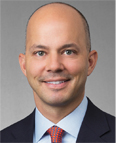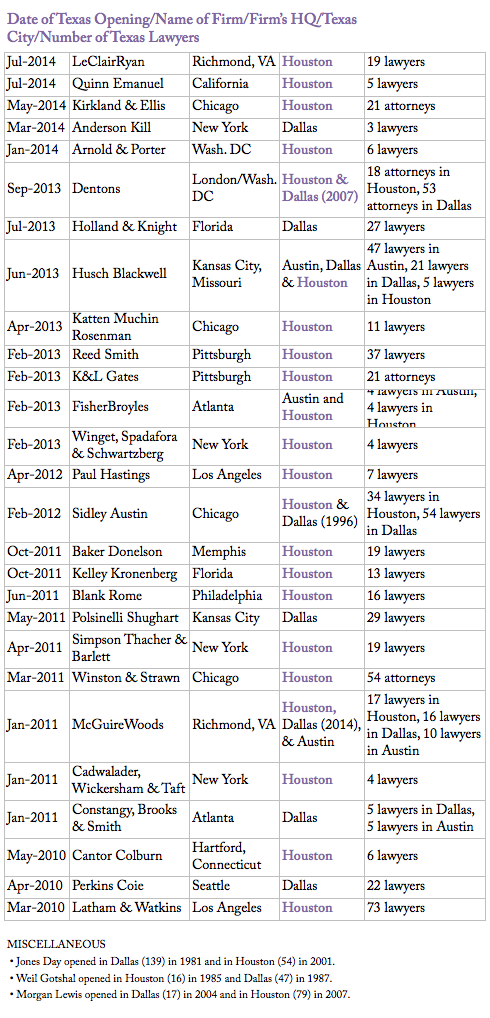© 2014 The Texas Lawbook.
By Mark Curriden – HOUSTON (August 7) – Paula Hinton, a Houston trial lawyer who represents some of the world’s largest oil and gas companies in huge-dollar disputes, always thought she would spend the rest of her career at Vinson & Elkins.

“There used to be a time when jumping to an out-of-state law firm was considered crazy talk because it didn’t make good business sense,” she says. “That’s not so anymore. This move allows me to be more entrepreneurial and grow my practice in ways that I was limited from doing so at V&E.”
Hinton is one of more than 600 Texas lawyers during the past five years who have left law firms headquartered in Texas to start or grow the Texas practices of law firms from Atlanta to Chicago and New York to Miami and Los Angeles.
Since February 2010, at least 30 out-of-state law firms have opened shop in Dallas, Houston and Austin. Two national law firms – Virginia-based LeClairRyan and California-based Quinn Emanuel – opened Houston offices just last month.
A dozen other national law firms, including Los Angeles-founded Gibson, Dunn & Crutcher and Philadelphia-based Morgan Lewis, have significantly expanded their Texas practices by raiding local firms for talent. And a handful of global mega-firms, including K&L Gates and Dentons, entered the Dallas and Houston markets during the past few years via mergers with established Texas firms. The most recent was Norton Rose’s combination last year with Fulbright & Jaworski in 2013.
The national law firms, according to legal industry insiders, have been offering multimillion-dollar guaranteed contracts to senior partners with large books of business. Even mid-level associates with no portable business were offered signing bonuses as high as $75,000.
“We are witnessing a fundamental change in the Texas legal market,” says Stephen Coats, the general counsel of Riverstone Holdings, a New York private equity firm that has about $20 billion in investments in oil and gas assets, most of it in Texas. “Some of the change is good and necessary, but not all of it.”
Coats and other corporate general counsel say that the trend means there are more choices and increased competition in the legal services sector. The larger national law firms offer a more global reach to Texas companies that are increasingly involved in international business transactions.
“Most energy companies today have global legal issues and we need lawyers with expertise and depth to handle these issues,” says Sean Johnson, chief managing counsel at Houston-based OOGC America, a subsidiary of China National Offshore Oil Corporation.
“At the same time, it is very good that the law firm has a local presence so that one of its partners can come by for a quick meeting,” says Johnson, who is president of the Association of Corporate Counsel’s Houston chapter.
While most of the national firms have targeted Houston, more than a dozen have opened branch operations in Dallas.
The invasion by national law firms doesn’t appear to be over. Lawyers at multiple law firms say they have received inquiries from legal headhunters trying to recruit attorneys for a handful of law firms still trying to break into the Houston or Dallas markets.

“If you want a piece of the oil and gas legal work, then you really have to be in the worldwide center of energy, and that is Houston,” he says.
The law firms that moved into Texas have witnessed extraordinary success and are capturing a significant portion of the legal work purchased by Texas businesses.
In addition, Mergermarket, an independent global M&A research firm, reports that 11 of the 20 law firms that represented the most Texas businesses involved in mergers and acquisitions during the first half of 2014 were non-Texas based firms.

“Deals are plentiful and the legal work on those deals is not price-sensitive,” he says.
For many years, the Texas market was “viewed as hostile” to outside law firms because Dallas and Houston were “dominated by three or four firms,” says Hugh Tanner, a former Fulbright partner who heads the Houston office of Morgan Lewis, which has grown from seven to 72 lawyers during the past five years.
Tanner says a small handful of large national law firms found success in Dallas and Houston, including Jones Day, Baker & McKenzie, Fish & Richardson, Patton Boggs and Weil, Gotshal & Manges, but that many more firms opened Texas offices in the 1980s and 1990s, only to close them a few years later because they were unsuccessful in luring partners away from their Dallas and Houston firms and failed to generate a solid client base.
Legal insiders say that the large legacy firms in Texas, including Baker Botts, V&E, Fulbright and Akin Gump, held a fierce grip on the Texas legal business by placing their lawyers into key corporate general counsel spots. Those GCs decide which lawyers to hire and they almost always chose the Texas firms they knew best.
“The Texas legal market has always been very tight-knit, some would say incestuous,” says a law firm consultant who asked not to be identified.
National law firms made a critical strategic mistake in the 1980s and 1990s by parachuting partners from New York and California into Houston – outside lawyers that had no previous relationships with Texas corporate general counsel. Most of those law firms failed.
That changed in February 2010 when Latham, a firm with more than 2,000 lawyers in 26 offices around the globe, opened in Houston. Latham poached a dozen entrenched corporate and tax partners from several large law firms in Houston, offering them compensation packages that were too lucrative to reject.
“The practice of law is global, but in many respects, it is also very local,” says Dillard. “We hired lawyers who are deeply rooted within the community and who have established relationships.”
It worked. Latham has grown from a dozen lawyers in 2010 to 75 now. Dillard says he expects the firm to have about 100 lawyers by the end of the year. The Houston office is Latham’s most profitable per partner.
“National law firms realized they cannot fake being a Texas law firm,” says Hinton, the Winston & Strawn partner. “Latham showed us that the model had changed and then the dam broke and firms started pouring into Texas.”
Legal industry insiders say that the flood of new law firms into Texas is the result of a perfect storm that occurred within the Texas business law community.
Lawyer loyalty to their hometown law firms weakened when their firms fired or forced long-time partners to leave as tort reform drastically reduced revenues of attorneys in litigation practice groups.
At the same time, businesses changed their strategy from hiring one or two law firms to handle all of their legal needs to instead hiring individual lawyers with the expertise they needed.
“I don’t hire law firms,” says Coats. “I hire lawyers I know, trust and have the experience necessary to do my projects.”
Coats points out that he primarily hires V&E lawyers to handle his transactional work, but that he now sometimes hires lawyers at Latham and Gibson Dunn who he used while they were still partners at V&E.
That shift in attitude, according to legal industry analysts, fueled the national law firm trend because non-Texas firms realized that the lawyers they hired from Texas-based firms would bring their client’s business with them to their new firms.
Within months of Latham entering the Houston market, Dallas veteran healthcare lawyer Jonathan Henderson started looking for a new home for his legal practice.

Then, in the spring of 2011, he received a called from a recruiter working for Polsinelli Shugart, a Kansas City firm that specializes in healthcare law.
“It was like I had found someone I had been looking for all my life,” he says. “Polsinelli was the perfect fit – a great match from a cultural and industry-focus standpoint.”
In the three years since, Polsinelli’s Dallas office has grown from five lawyers to more than 30 and the firm has witnessed tremendous success in adding clients from the healthcare community in Texas.
“Jon showed us that Polsinelli, with its offices throughout the Midwest and Southwest, fit perfectly with our footprint,” says Matt McMurphy, general counsel at Encompass Home Healthcare in Dallas. “They have tremendous expertise in the locations where we need it. That is invaluable.”
Dillard and others say the trend of national firms moving into Texas will continue, but that the “newest law firms will start cannibalizing other new firms.”
That has already started happening.
When Kirkland & Ellis, a century-old Chicago firm that has more than 1,500 lawyers worldwide and revenues exceeding $2 billion, opened its Houston office in May, its first hire was Andrew Calder, a prominent private equity partner who only three years ago opened the Houston office of Wall Street powerhouse Simpson Thacher & Bartlett.

“I was very happy at V&E and had no intention of leaving when Andy called me about Kirkland and the opportunity to build a whole new office at a truly great law firm,” says corporate law partner William Bos, who joined Kirkland in July along with former Baker Botts partner Anthony Speier III.

Legal analysts say you shouldn’t feel sorry for the Texas-based law firms. V&E and Baker Botts, for example, reported record revenues and profits during the past five years.
“The national mega-firms are eating up a considerable portion of the Texas legal pie,” says law firm consultant Ward Bower at Altman Weil. “But it is a really big pie and thanks to the energy sector, it keeps getting bigger.”

© 2014 The Texas Lawbook. Content of The Texas Lawbook is controlled and protected by specific licensing agreements with our subscribers and under federal copyright laws. Any distribution of this content without the consent of The Texas Lawbook is prohibited.
If you see any inaccuracy in any article in The Texas Lawbook, please contact us. Our goal is content that is 100% true and accurate. Thank you.
